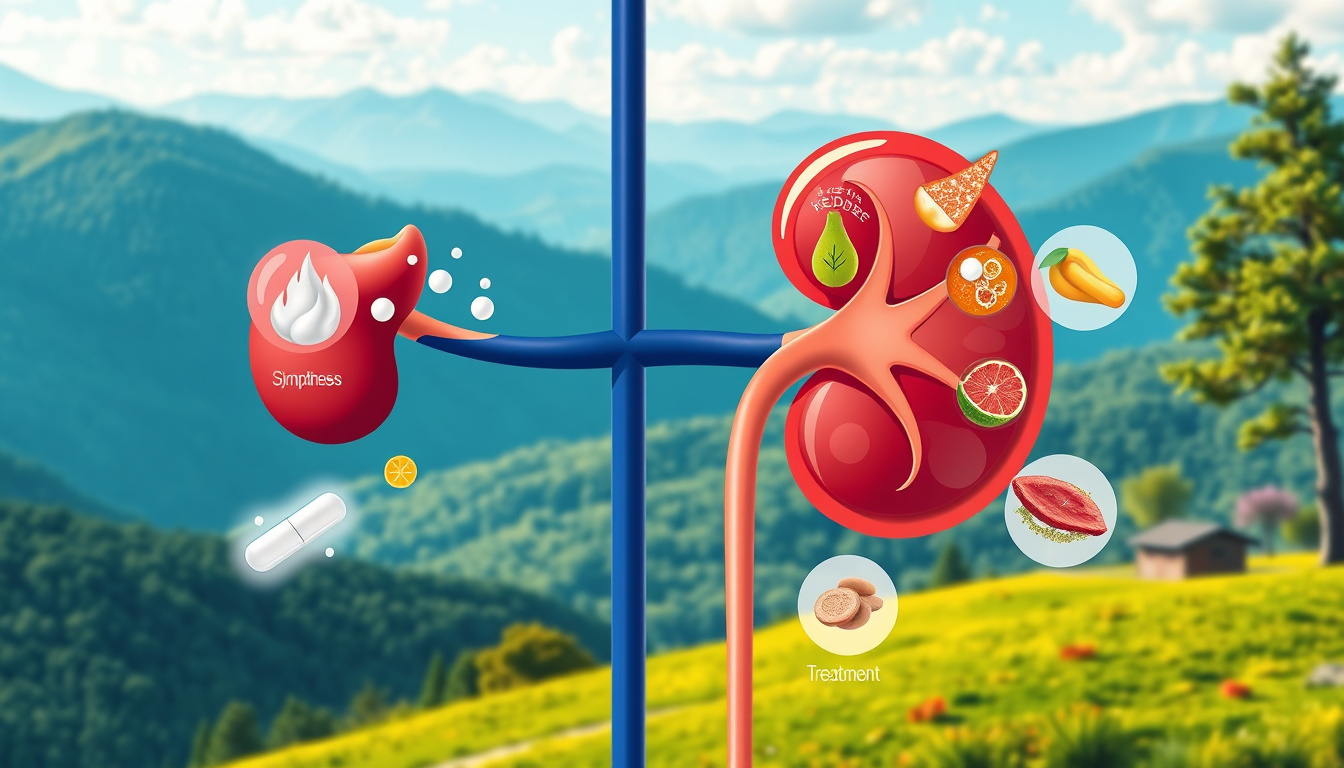Understanding Kidney Disease: Symptoms, Treatments, and Lifestyle Changes to Protect Your Health
Share

Kidney Disease: Symptoms, Treatments, and Lifestyle Changes to Protect Your Health
Kidney disease is a serious health condition affecting millions worldwide. Understanding its symptoms, treatments, and the lifestyle changes necessary to protect your health can make a huge difference in managing the disease effectively. This article will guide you through essential information about kidney disease, helping you stay informed and proactive in caring for your kidneys.
What Is Kidney Disease?
Kidney disease refers to conditions that impair the kidneys’ ability to filter waste and excess fluids from your blood. When kidneys don’t work properly, waste builds up in your body, which can lead to serious health issues.
Chronic Kidney Disease (CKD) is the most common type, developing slowly over months or years. Acute kidney injury, on the other hand, happens suddenly, often due to illness or injury.
How Do Kidneys Work?
Your kidneys are two bean-shaped organs located at the back of your abdomen. Their main job is to filter your blood, removing waste, excess fluids, and balancing electrolytes. They also help regulate blood pressure and produce hormones involved in making red blood cells.
When kidney function declines, harmful wastes start to accumulate, causing various symptoms and complications.
Signs and Symptoms of Kidney Disease
One of the challenges in detecting kidney disease is that symptoms may not appear until the condition is advanced. Early detection is crucial, so it helps to recognize warning signs such as:
- Fatigue and Weakness: Waste buildup can reduce your energy levels.
- Swelling (Edema): Poor kidney function can cause water retention, leading to swelling in your legs, ankles, feet, or around your eyes.
- Changes in Urine: You may notice foamy urine, blood in urine, or increased frequency, especially at night.
- Shortness of Breath: Fluid buildup in the lungs can cause difficulty breathing.
- High Blood Pressure: Kidneys help regulate blood pressure; their failure can increase hypertension.
- Nausea and Vomiting: Toxins might irritate your digestive system.
- Itchy Skin: Waste products can cause skin irritation.
If you notice any of these symptoms, consult your healthcare provider as early kidney disease treatment can prevent further damage.
Causes and Risk Factors of Kidney Disease
Several conditions can lead to kidney disease. The most common causes include:
- Diabetes: High blood sugar over time damages the tiny filters in your kidneys.
- High Blood Pressure: Increased pressure harms kidney blood vessels.
- Glomerulonephritis: Inflammation of kidney filtering units.
- Polycystic Kidney Disease: A genetic disorder causing cysts in kidneys.
- Prolonged Use of Certain Medications: Some painkillers and anti-inflammatory drugs can harm kidneys if overused.
Risk factors that make kidney disease more likely:
- Being over 60 years old.
- Family history of kidney disease.
- Obesity or metabolic syndrome.
- Uncontrolled high blood sugar or blood pressure.
- Smoking and a sedentary lifestyle.
Diagnosing Kidney Disease
Doctors use several tests to diagnose kidney disease, including:
- Blood Tests: Measuring creatinine and urea nitrogen levels to assess kidney function.
- Urine Tests: Checking for protein or blood in urine.
- Imaging Tests: Ultrasound or CT scans to look at kidney structure.
- Kidney Biopsy: In some cases, a small tissue sample is taken to pinpoint the exact cause.
Early diagnosis is critical to slow disease progression and manage symptoms.
Treatment Options for Kidney Disease
While some kidney diseases cannot be cured, treatments aim to:
- Control underlying causes like diabetes or high blood pressure.
- Manage symptoms to improve quality of life.
- Slow disease progression to delay or prevent kidney failure.
Common treatments include:
- Medications: Blood pressure drugs (like ACE inhibitors), medications to lower cholesterol, and drugs to treat anemia.
- Dietary Changes: Reducing salt, protein, and potassium intake according to medical advice.
- Lifestyle Modifications: Regular exercise, quitting smoking, and weight management.
- Dialysis: This treatment replaces kidney function by filtering blood in advanced kidney failure.
- Kidney Transplant: For some, a transplant may be necessary.
An individualized care plan from healthcare providers helps control the disease effectively.
Lifestyle Changes to Protect Kidney Health
Preventing or managing kidney disease requires lifestyle adjustments that support your overall health and kidney function.
1. Healthy Diet
Eating a balanced diet rich in fruits, vegetables, whole grains, and low in processed foods helps reduce the burden on your kidneys. Specific dietary tips include:
- Limit salt to control blood pressure.
- Avoid high amounts of protein to reduce kidney workload.
- Stay hydrated but avoid excessive fluid intake if advised.
2. Regular Exercise
Physical activity keeps your heart and blood vessels healthy, which supports kidney function. Aim for at least 30 minutes of moderate exercise most days of the week.
3. Manage Blood Sugar and Blood Pressure
Keeping these conditions under control is vital. Take medications as prescribed and monitor your levels regularly.
4. Avoid Smoking and Limit Alcohol
Smoking harms blood vessels, worsening kidney damage. Alcohol in moderation is less harmful but consult your doctor.
5. Stay Hydrated
Drink enough water daily for optimal kidney filtration, but if you already have kidney disease, follow your doctor’s advice about fluid intake.
Natural Support for Healthy Hair and Kidneys Connection
Did you know that kidney disease can indirectly affect your hair health? Poor kidney function may cause hair thinning and dryness due to nutrient imbalances or medications.
Taking care of your scalp and hair during kidney disease is important. A natural, non-medical shampoo like Watermans Grow Me Shampoo can energize your scalp and volumize hair from the roots. It contains Biotin, Rosemary, Caffeine, Niacinamide, Argan Oil, Allantoin, and Lupin Protein, known for nourishing and strengthening hair naturally.
Before trying any new hair care product, always consult your healthcare provider, especially if you have kidney-related health concerns.
Common Questions About Kidney Disease
Q1: Can kidney disease be cured?
Kidney disease is usually chronic and cannot be fully cured, but early treatment can slow its progression.
Q2: How often should I get my kidneys checked?
If you have risk factors, get tested annually or as advised by your doctor.
Q3: Does drinking more water help prevent kidney disease?
Staying hydrated supports kidney function, but excessive water intake can be harmful, especially in advanced disease.
Q4: Is dialysis painful?
Dialysis is generally not painful, though some discomfort or side effects may occur.
Q5: Can diet alone reverse kidney disease?
Diet helps manage symptoms but cannot reverse existing damage.
Q6: Are there natural supplements that help kidney health?
Some supplements may support kidney function, but always discuss with your doctor before taking any.
Q7: How does diabetes cause kidney disease?
High blood sugar damages small kidney blood vessels over time.
Q8: Can stress affect kidney function?
Chronic stress can impact blood pressure and overall health, indirectly affecting kidneys.
Q9: Is hair loss common with kidney disease?
Yes, due to nutrient imbalances and some medications.
Q10: What lifestyle change has the greatest impact on kidney health?
Controlling blood pressure and blood sugar levels is key to protecting your kidneys.
Did You Know?
- Kidneys filter about 50 gallons of blood daily, producing 1 to 2 quarts of urine.
- High blood pressure is both a cause and a result of kidney disease.
- Polycystic Kidney Disease affects about 600,000 Americans, often requiring a transplant.
- Hair loss can be an early sign of chronic illness affecting the body, including kidney disease.
- Regular exercise can help reduce the risk of developing kidney disease by improving cardiovascular health.
By staying informed and proactive, you can protect your kidneys and overall health. For those experiencing hair thinning or scalp concerns during kidney disease management, consider trying Watermans Grow Me Shampoo — a natural, energizing shampoo designed to support healthy hair growth without medical chemicals.
Take charge of your health today!



